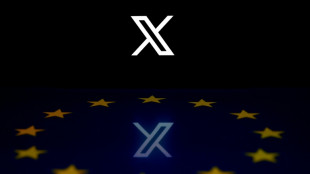
-
 German broadcaster recalls correspondent over AI-generated images
German broadcaster recalls correspondent over AI-generated images
-
US Supreme Court strikes down swath of Trump global tariffs

-
 England's Itoje says managing 'emotional turmoil' key to 100 cap landmark
England's Itoje says managing 'emotional turmoil' key to 100 cap landmark
-
Trump says weighing strike on Iran as Tehran says draft deal coming soon

-
 Tudor is '100 percent' certain of saving Spurs from relegation
Tudor is '100 percent' certain of saving Spurs from relegation
-
Azam dropped for scoring too slowly, says Pakistan coach Hesson

-
 Stocks volatile after soft US growth data, court ruling against tariffs
Stocks volatile after soft US growth data, court ruling against tariffs
-
Italy bring back Capuozzo for France Six Nations trip

-
 From Malinin's collapse to Liu's triumph: Top Olympic figure skating moments
From Malinin's collapse to Liu's triumph: Top Olympic figure skating moments
-
Arteta urges Arsenal to 'write own destiny' after title wobble

-
 Ukraine Paralympics team to boycott opening ceremony over Russian flag decision
Ukraine Paralympics team to boycott opening ceremony over Russian flag decision
-
Wales captain Lake wants fans to bring 'noise' against Scotland

-
 Skier Vonn's Italian hospital a hotbed of men, sister says
Skier Vonn's Italian hospital a hotbed of men, sister says
-
India target S.Africa top order, Abhishek to come good: bowling coach

-
 Carrick praises Man Utd 'diversity' after Ratcliffe's immigrant rant
Carrick praises Man Utd 'diversity' after Ratcliffe's immigrant rant
-
I never thought it would be hit, says 'Scream' creator 30 years later

-
 AI summit statement delayed to 'maximise' signatories: India
AI summit statement delayed to 'maximise' signatories: India
-
Barcelona's Sagrada Familia basilica hits peak height

-
 Milan sprints to second straight UAE stage win as Tiberi keeps lead
Milan sprints to second straight UAE stage win as Tiberi keeps lead
-
US GDP growth misses expectations as Trump blames shutdown

-
 Benfica investigate video of fans' monkey gestures
Benfica investigate video of fans' monkey gestures
-
French minister pledges tight security at rally for killed activist

-
 Guardiola 'couldn't care less' about Arsenal stumble in title race
Guardiola 'couldn't care less' about Arsenal stumble in title race
-
UK police search property as royals reel from Andrew's arrest

-
 Germany's Merz to visit China next week
Germany's Merz to visit China next week
-
Kompany says Mourinho made 'huge mistake' in Vinicius racism row

-
 X appeals EU's 120-mn-euro fine over digital content violations
X appeals EU's 120-mn-euro fine over digital content violations
-
Galthie recalls hulking locks Flament, Meafou for Italy

-
 Turkey, Saudi sign major solar power deal
Turkey, Saudi sign major solar power deal
-
US Olympic freeskier Hess embraces 'loser' tag after Trump blast

-
 European stocks rebound, oil prices ease after US-Iran volatility
European stocks rebound, oil prices ease after US-Iran volatility
-
'Alpha male' AI world shuts out women: computing prof Hall

-
 New Zealand freestyle skier Ives in hard Olympic crash
New Zealand freestyle skier Ives in hard Olympic crash
-
New Zealand must adapt quickly to Sri Lanka wickets: Chapman

-
 Thai activist's jail term for royal insult extended to 30 years
Thai activist's jail term for royal insult extended to 30 years
-
Families of Duterte's drug war victims eye Hague hearing with hope

-
 India chases 'DeepSeek moment' with homegrown AI
India chases 'DeepSeek moment' with homegrown AI
-
UN touts panel for 'human control' of AI at global summit

-
 Ukraine Paralympics team to boycott Opening Ceremony over Russian flag decision: statement
Ukraine Paralympics team to boycott Opening Ceremony over Russian flag decision: statement
-
UK monarchy reels from Andrew's stunning arrest

-
 Somaliland, where Muslims love Israel
Somaliland, where Muslims love Israel
-
Florida airport to be renamed after US President Donald Trump

-
 Fans flock to Japan zoo to see viral baby monkey Punch
Fans flock to Japan zoo to see viral baby monkey Punch
-
Stocks mixed, oil rises after Trump Iran threat

-
 Outspoken Laos lawmaker's election exit sparks rare dissent
Outspoken Laos lawmaker's election exit sparks rare dissent
-
Kim Jong Un vows to boost living standards as he opens rare congress

-
 Shepherd hat-trick to Samra ton: Five top T20 World Cup performances so far
Shepherd hat-trick to Samra ton: Five top T20 World Cup performances so far
-
Zimbabwe surprise as T20 World Cup Super Eights begin without Australia

-
 Victorious Takaichi promises 'strong and prosperous' Japan
Victorious Takaichi promises 'strong and prosperous' Japan
-
Ex-South Korea leader apologises for martial law crisis


Clamping down on 'forever chemicals'
Contaminating water and soil, human-made "forever chemicals" widely used since the mid-20th century, are facing increasing regulation worldwide.
Officially known as PFAS, or per- and polyfluoroalkyl substances, they are a family of synthetic chemicals able to withstand intense heat and can repel water and grease.
They are found in cars, planes, clothes, leather, household products, electronics, food processing and medical equipment.
But when they seep into groundwater, surface water and soil, PFAS can pose a toxic health risk and they persist for a very long time.
A recap of key measures regulating the use PFAS:
- Stockholm Convention -
The Stockholm Convention on Persistent Organic Pollutants, concluded in 2001 and coming into force in 2004, was the first international text to regulate organic chemicals, including PFAS.
The Convention, signed by more than 150 countries -- but not the US or China -- added in 2019 to its list of substances banned for production and use, perfluorooctanoic acid (PFOA), used since the 1950s by US company DuPont to manufacture its non-stick coating Teflon.
The Convention has prohibited its use, except under exemption.
Another PFAS, PFHxS or perfluorohexane sulfonic acid, used for example in fire-fighting foam, metal plating, textiles, polishing and cleaning agents, has been on the banned products list since 2022.
Similarly, the use of another PFAS, perfluorooctane sulfonic acid (PFOS), known for its use as a waterproofing agent by the US group 3M, has been heavily restricted since 2009.
- Europe's restriction project -
The European Commission intends to present in 2026 a proposal to ban PFAS in everyday consumer products such as pizza boxes or waterproof clothing, with exceptions for some deemed essential, particularly in the medical field.
Due to an intense lobbying campaign the adoption of this regulation scheduled for 2025 is not expected before 2026 or 2027, according to an investigation coordinated by French daily Le Monde.
Meanwhile, a European regulation from December 2024 to come into force in August 2026 establishes maximum concentrations for PFAS in any packaging intended to come into contact with foodstuffs.
A European directive on water quality, which came into force in 2021, provides for the implementation as of 2026 of maximum concentration thresholds for twenty PFAS in European tap water.
- Denmark action plan -
The Danish parliament adopted an action plan against PFAS in May 2024, aiming to prevent and reduce water and soil pollution from forever chemicals.
The plan also includes banning the use of PFAS in clothing and certain chemicals, while Denmark has banned the use of PFAS in food packaging since 2020.
Another Scandinavian country, Norway, banned the use of perfluorooctanoic acid (PFOA) for textiles and other everyday consumer products back in 2014.
- New legislation in France -
A French law, enacted in February, bans cosmetics, clothing, shoes, and ski waxes containing PFAS as of 2026. In 2030, all textiles with PFAS will be banned.
This pioneering legislation also mandates the monitoring of PFAS concentrations in drinking water.
Industrial polluters will be taxed 100 euros per 100 grams of discharged substances, according to the "polluter pays" principle.
- Limit thresholds in US water -
In the United States, the Environmental Protection Agency (EPA) established maximum concentration thresholds for six PFAS in tap water in 2024. These thresholds will become mandatory in 2029.
In parallel, the EPA has classified PFOA and PFOS, the two most studied PFAS, as hazardous substances.
- Canada phase-out -
In March 2025 Canada announced its plan to phase out PFAS in many products starting in 2027.
PFAS would first be banned in firefighting foams, followed by cosmetics, food packaging, textiles, medicines, and medical devices.
D.Moore--AMWN

